Healthcare Global Public Health Module 1: Critical Reflection Analysis
VerifiedAdded on 2022/12/20
|5
|1455
|58
Report
AI Summary
This report presents a critical reflection on the first module of a global public health course. The student analyzes the social determinants of health (SDH) framework, focusing on its impact on AIDS/HIV prevention in South Africa. The reflection highlights the importance of expanding healthcare systems, addressing discrimination, and promoting safe practices. The report also examines the Alma-Ata Declaration, emphasizing the need for social and economic development to improve health outcomes. The student expresses agreement with the declaration, citing the influence of economic factors on healthcare performance and the significance of social development in reducing health disparities. Furthermore, the reflection touches upon obesity as a result of unhealthy eating habits and discusses the distinction between social and economic determinants of health. The conclusion emphasizes the role of SDH in shaping health outcomes and the importance of individual responsibility and government action. Finally, the student expresses a desire to discuss these topics to increase awareness and understanding of actions needed to promote global health.
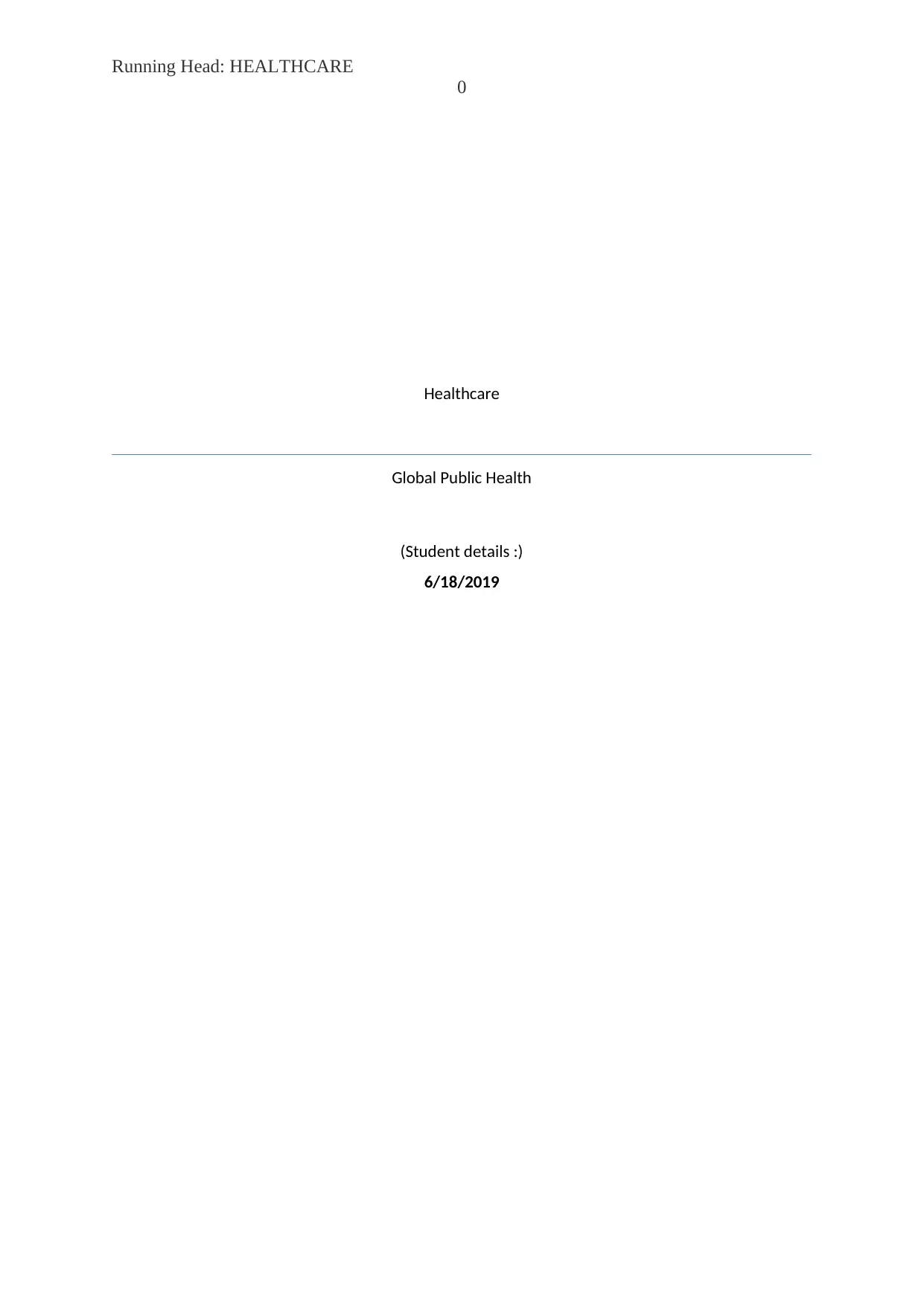
Running Head: HEALTHCARE
0
Healthcare
Global Public Health
(Student details :)
6/18/2019
0
Healthcare
Global Public Health
(Student details :)
6/18/2019
Paraphrase This Document
Need a fresh take? Get an instant paraphrase of this document with our AI Paraphraser
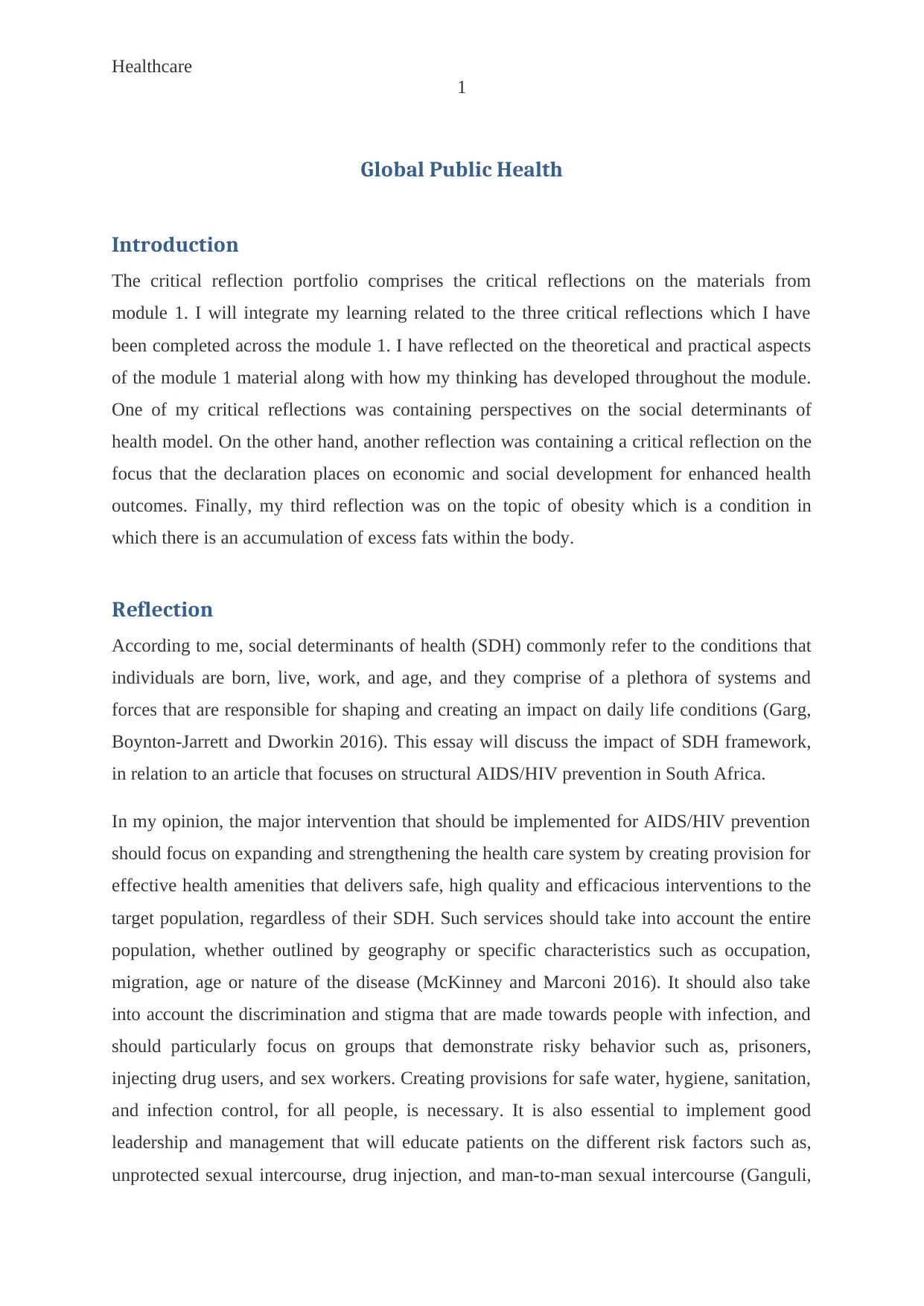
Healthcare
1
Global Public Health
Introduction
The critical reflection portfolio comprises the critical reflections on the materials from
module 1. I will integrate my learning related to the three critical reflections which I have
been completed across the module 1. I have reflected on the theoretical and practical aspects
of the module 1 material along with how my thinking has developed throughout the module.
One of my critical reflections was containing perspectives on the social determinants of
health model. On the other hand, another reflection was containing a critical reflection on the
focus that the declaration places on economic and social development for enhanced health
outcomes. Finally, my third reflection was on the topic of obesity which is a condition in
which there is an accumulation of excess fats within the body.
Reflection
According to me, social determinants of health (SDH) commonly refer to the conditions that
individuals are born, live, work, and age, and they comprise of a plethora of systems and
forces that are responsible for shaping and creating an impact on daily life conditions (Garg,
Boynton-Jarrett and Dworkin 2016). This essay will discuss the impact of SDH framework,
in relation to an article that focuses on structural AIDS/HIV prevention in South Africa.
In my opinion, the major intervention that should be implemented for AIDS/HIV prevention
should focus on expanding and strengthening the health care system by creating provision for
effective health amenities that delivers safe, high quality and efficacious interventions to the
target population, regardless of their SDH. Such services should take into account the entire
population, whether outlined by geography or specific characteristics such as occupation,
migration, age or nature of the disease (McKinney and Marconi 2016). It should also take
into account the discrimination and stigma that are made towards people with infection, and
should particularly focus on groups that demonstrate risky behavior such as, prisoners,
injecting drug users, and sex workers. Creating provisions for safe water, hygiene, sanitation,
and infection control, for all people, is necessary. It is also essential to implement good
leadership and management that will educate patients on the different risk factors such as,
unprotected sexual intercourse, drug injection, and man-to-man sexual intercourse (Ganguli,
1
Global Public Health
Introduction
The critical reflection portfolio comprises the critical reflections on the materials from
module 1. I will integrate my learning related to the three critical reflections which I have
been completed across the module 1. I have reflected on the theoretical and practical aspects
of the module 1 material along with how my thinking has developed throughout the module.
One of my critical reflections was containing perspectives on the social determinants of
health model. On the other hand, another reflection was containing a critical reflection on the
focus that the declaration places on economic and social development for enhanced health
outcomes. Finally, my third reflection was on the topic of obesity which is a condition in
which there is an accumulation of excess fats within the body.
Reflection
According to me, social determinants of health (SDH) commonly refer to the conditions that
individuals are born, live, work, and age, and they comprise of a plethora of systems and
forces that are responsible for shaping and creating an impact on daily life conditions (Garg,
Boynton-Jarrett and Dworkin 2016). This essay will discuss the impact of SDH framework,
in relation to an article that focuses on structural AIDS/HIV prevention in South Africa.
In my opinion, the major intervention that should be implemented for AIDS/HIV prevention
should focus on expanding and strengthening the health care system by creating provision for
effective health amenities that delivers safe, high quality and efficacious interventions to the
target population, regardless of their SDH. Such services should take into account the entire
population, whether outlined by geography or specific characteristics such as occupation,
migration, age or nature of the disease (McKinney and Marconi 2016). It should also take
into account the discrimination and stigma that are made towards people with infection, and
should particularly focus on groups that demonstrate risky behavior such as, prisoners,
injecting drug users, and sex workers. Creating provisions for safe water, hygiene, sanitation,
and infection control, for all people, is necessary. It is also essential to implement good
leadership and management that will educate patients on the different risk factors such as,
unprotected sexual intercourse, drug injection, and man-to-man sexual intercourse (Ganguli,
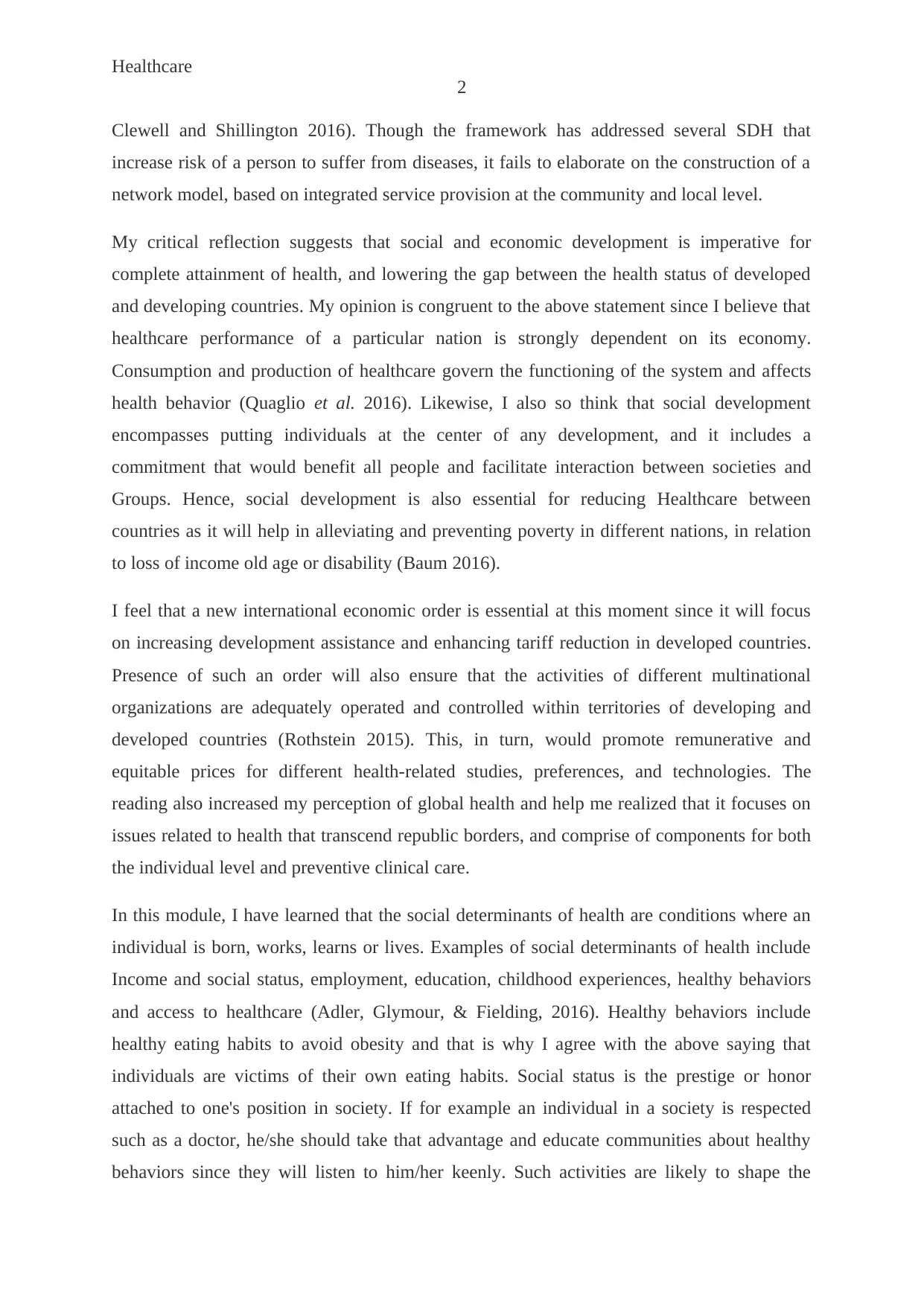
Healthcare
2
Clewell and Shillington 2016). Though the framework has addressed several SDH that
increase risk of a person to suffer from diseases, it fails to elaborate on the construction of a
network model, based on integrated service provision at the community and local level.
My critical reflection suggests that social and economic development is imperative for
complete attainment of health, and lowering the gap between the health status of developed
and developing countries. My opinion is congruent to the above statement since I believe that
healthcare performance of a particular nation is strongly dependent on its economy.
Consumption and production of healthcare govern the functioning of the system and affects
health behavior (Quaglio et al. 2016). Likewise, I also so think that social development
encompasses putting individuals at the center of any development, and it includes a
commitment that would benefit all people and facilitate interaction between societies and
Groups. Hence, social development is also essential for reducing Healthcare between
countries as it will help in alleviating and preventing poverty in different nations, in relation
to loss of income old age or disability (Baum 2016).
I feel that a new international economic order is essential at this moment since it will focus
on increasing development assistance and enhancing tariff reduction in developed countries.
Presence of such an order will also ensure that the activities of different multinational
organizations are adequately operated and controlled within territories of developing and
developed countries (Rothstein 2015). This, in turn, would promote remunerative and
equitable prices for different health-related studies, preferences, and technologies. The
reading also increased my perception of global health and help me realized that it focuses on
issues related to health that transcend republic borders, and comprise of components for both
the individual level and preventive clinical care.
In this module, I have learned that the social determinants of health are conditions where an
individual is born, works, learns or lives. Examples of social determinants of health include
Income and social status, employment, education, childhood experiences, healthy behaviors
and access to healthcare (Adler, Glymour, & Fielding, 2016). Healthy behaviors include
healthy eating habits to avoid obesity and that is why I agree with the above saying that
individuals are victims of their own eating habits. Social status is the prestige or honor
attached to one's position in society. If for example an individual in a society is respected
such as a doctor, he/she should take that advantage and educate communities about healthy
behaviors since they will listen to him/her keenly. Such activities are likely to shape the
2
Clewell and Shillington 2016). Though the framework has addressed several SDH that
increase risk of a person to suffer from diseases, it fails to elaborate on the construction of a
network model, based on integrated service provision at the community and local level.
My critical reflection suggests that social and economic development is imperative for
complete attainment of health, and lowering the gap between the health status of developed
and developing countries. My opinion is congruent to the above statement since I believe that
healthcare performance of a particular nation is strongly dependent on its economy.
Consumption and production of healthcare govern the functioning of the system and affects
health behavior (Quaglio et al. 2016). Likewise, I also so think that social development
encompasses putting individuals at the center of any development, and it includes a
commitment that would benefit all people and facilitate interaction between societies and
Groups. Hence, social development is also essential for reducing Healthcare between
countries as it will help in alleviating and preventing poverty in different nations, in relation
to loss of income old age or disability (Baum 2016).
I feel that a new international economic order is essential at this moment since it will focus
on increasing development assistance and enhancing tariff reduction in developed countries.
Presence of such an order will also ensure that the activities of different multinational
organizations are adequately operated and controlled within territories of developing and
developed countries (Rothstein 2015). This, in turn, would promote remunerative and
equitable prices for different health-related studies, preferences, and technologies. The
reading also increased my perception of global health and help me realized that it focuses on
issues related to health that transcend republic borders, and comprise of components for both
the individual level and preventive clinical care.
In this module, I have learned that the social determinants of health are conditions where an
individual is born, works, learns or lives. Examples of social determinants of health include
Income and social status, employment, education, childhood experiences, healthy behaviors
and access to healthcare (Adler, Glymour, & Fielding, 2016). Healthy behaviors include
healthy eating habits to avoid obesity and that is why I agree with the above saying that
individuals are victims of their own eating habits. Social status is the prestige or honor
attached to one's position in society. If for example an individual in a society is respected
such as a doctor, he/she should take that advantage and educate communities about healthy
behaviors since they will listen to him/her keenly. Such activities are likely to shape the
⊘ This is a preview!⊘
Do you want full access?
Subscribe today to unlock all pages.

Trusted by 1+ million students worldwide
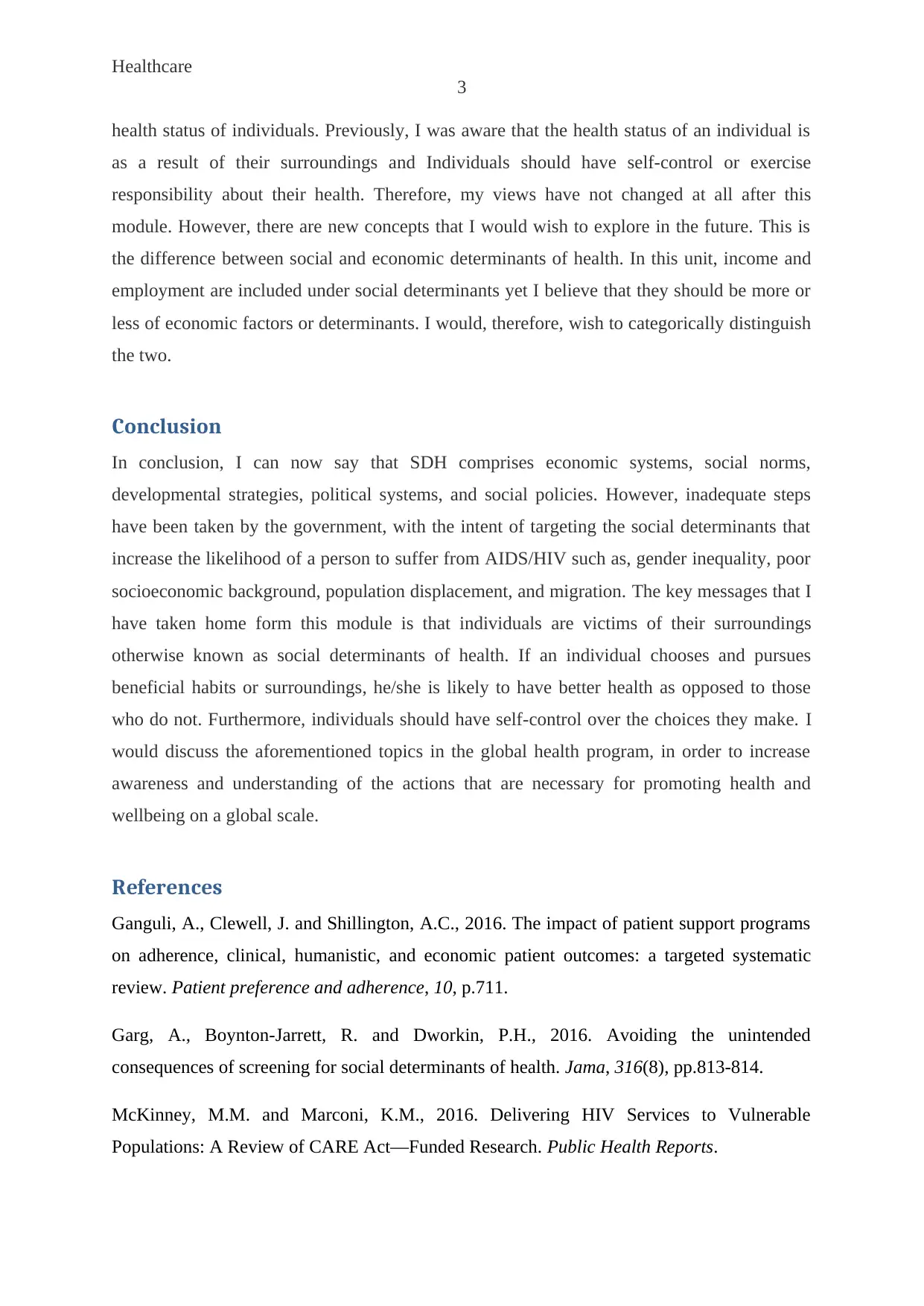
Healthcare
3
health status of individuals. Previously, I was aware that the health status of an individual is
as a result of their surroundings and Individuals should have self-control or exercise
responsibility about their health. Therefore, my views have not changed at all after this
module. However, there are new concepts that I would wish to explore in the future. This is
the difference between social and economic determinants of health. In this unit, income and
employment are included under social determinants yet I believe that they should be more or
less of economic factors or determinants. I would, therefore, wish to categorically distinguish
the two.
Conclusion
In conclusion, I can now say that SDH comprises economic systems, social norms,
developmental strategies, political systems, and social policies. However, inadequate steps
have been taken by the government, with the intent of targeting the social determinants that
increase the likelihood of a person to suffer from AIDS/HIV such as, gender inequality, poor
socioeconomic background, population displacement, and migration. The key messages that I
have taken home form this module is that individuals are victims of their surroundings
otherwise known as social determinants of health. If an individual chooses and pursues
beneficial habits or surroundings, he/she is likely to have better health as opposed to those
who do not. Furthermore, individuals should have self-control over the choices they make. I
would discuss the aforementioned topics in the global health program, in order to increase
awareness and understanding of the actions that are necessary for promoting health and
wellbeing on a global scale.
References
Ganguli, A., Clewell, J. and Shillington, A.C., 2016. The impact of patient support programs
on adherence, clinical, humanistic, and economic patient outcomes: a targeted systematic
review. Patient preference and adherence, 10, p.711.
Garg, A., Boynton-Jarrett, R. and Dworkin, P.H., 2016. Avoiding the unintended
consequences of screening for social determinants of health. Jama, 316(8), pp.813-814.
McKinney, M.M. and Marconi, K.M., 2016. Delivering HIV Services to Vulnerable
Populations: A Review of CARE Act—Funded Research. Public Health Reports.
3
health status of individuals. Previously, I was aware that the health status of an individual is
as a result of their surroundings and Individuals should have self-control or exercise
responsibility about their health. Therefore, my views have not changed at all after this
module. However, there are new concepts that I would wish to explore in the future. This is
the difference between social and economic determinants of health. In this unit, income and
employment are included under social determinants yet I believe that they should be more or
less of economic factors or determinants. I would, therefore, wish to categorically distinguish
the two.
Conclusion
In conclusion, I can now say that SDH comprises economic systems, social norms,
developmental strategies, political systems, and social policies. However, inadequate steps
have been taken by the government, with the intent of targeting the social determinants that
increase the likelihood of a person to suffer from AIDS/HIV such as, gender inequality, poor
socioeconomic background, population displacement, and migration. The key messages that I
have taken home form this module is that individuals are victims of their surroundings
otherwise known as social determinants of health. If an individual chooses and pursues
beneficial habits or surroundings, he/she is likely to have better health as opposed to those
who do not. Furthermore, individuals should have self-control over the choices they make. I
would discuss the aforementioned topics in the global health program, in order to increase
awareness and understanding of the actions that are necessary for promoting health and
wellbeing on a global scale.
References
Ganguli, A., Clewell, J. and Shillington, A.C., 2016. The impact of patient support programs
on adherence, clinical, humanistic, and economic patient outcomes: a targeted systematic
review. Patient preference and adherence, 10, p.711.
Garg, A., Boynton-Jarrett, R. and Dworkin, P.H., 2016. Avoiding the unintended
consequences of screening for social determinants of health. Jama, 316(8), pp.813-814.
McKinney, M.M. and Marconi, K.M., 2016. Delivering HIV Services to Vulnerable
Populations: A Review of CARE Act—Funded Research. Public Health Reports.
Paraphrase This Document
Need a fresh take? Get an instant paraphrase of this document with our AI Paraphraser
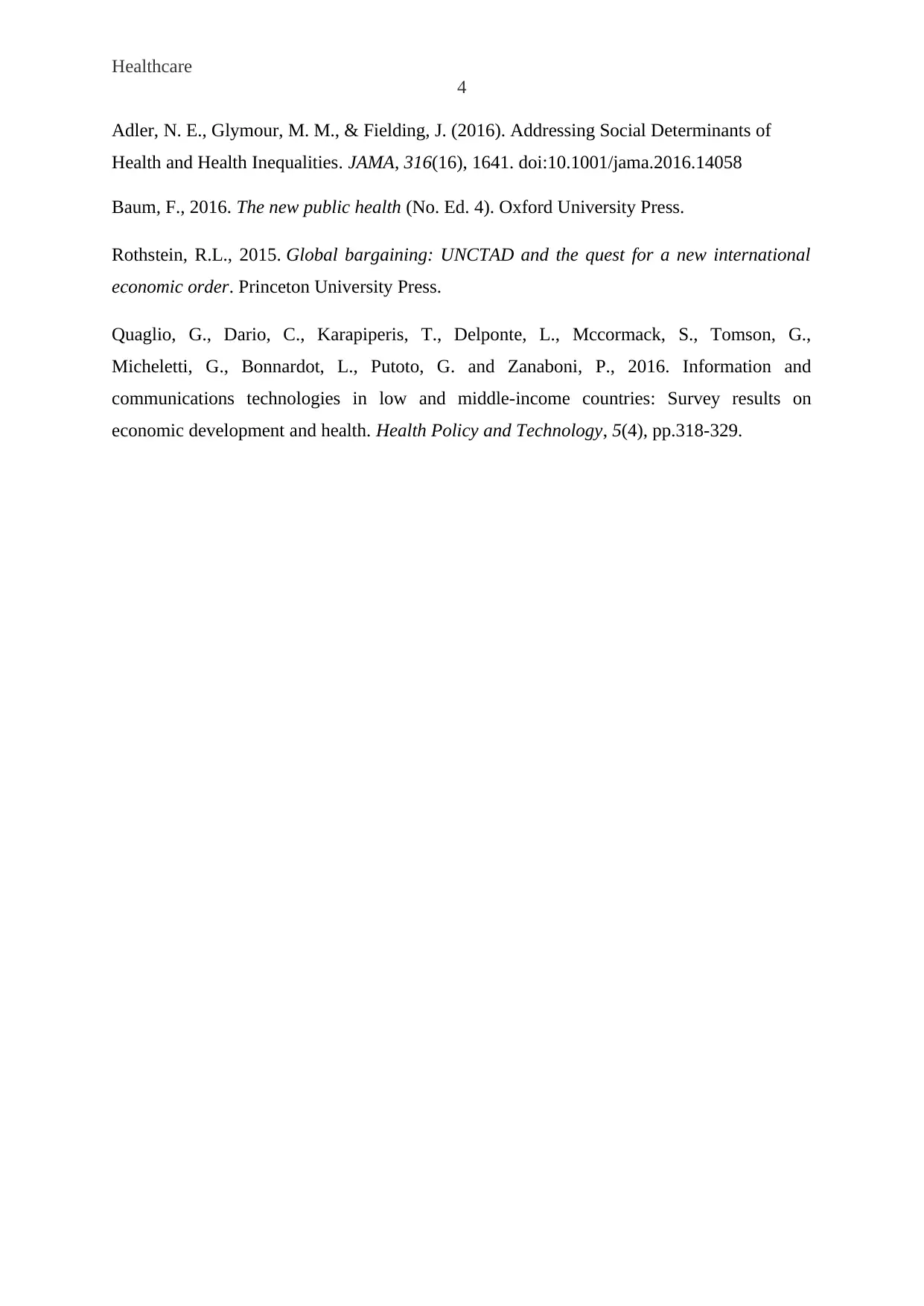
Healthcare
4
Adler, N. E., Glymour, M. M., & Fielding, J. (2016). Addressing Social Determinants of
Health and Health Inequalities. JAMA, 316(16), 1641. doi:10.1001/jama.2016.14058
Baum, F., 2016. The new public health (No. Ed. 4). Oxford University Press.
Rothstein, R.L., 2015. Global bargaining: UNCTAD and the quest for a new international
economic order. Princeton University Press.
Quaglio, G., Dario, C., Karapiperis, T., Delponte, L., Mccormack, S., Tomson, G.,
Micheletti, G., Bonnardot, L., Putoto, G. and Zanaboni, P., 2016. Information and
communications technologies in low and middle-income countries: Survey results on
economic development and health. Health Policy and Technology, 5(4), pp.318-329.
4
Adler, N. E., Glymour, M. M., & Fielding, J. (2016). Addressing Social Determinants of
Health and Health Inequalities. JAMA, 316(16), 1641. doi:10.1001/jama.2016.14058
Baum, F., 2016. The new public health (No. Ed. 4). Oxford University Press.
Rothstein, R.L., 2015. Global bargaining: UNCTAD and the quest for a new international
economic order. Princeton University Press.
Quaglio, G., Dario, C., Karapiperis, T., Delponte, L., Mccormack, S., Tomson, G.,
Micheletti, G., Bonnardot, L., Putoto, G. and Zanaboni, P., 2016. Information and
communications technologies in low and middle-income countries: Survey results on
economic development and health. Health Policy and Technology, 5(4), pp.318-329.
1 out of 5
Related Documents
Your All-in-One AI-Powered Toolkit for Academic Success.
+13062052269
info@desklib.com
Available 24*7 on WhatsApp / Email
![[object Object]](/_next/static/media/star-bottom.7253800d.svg)
Unlock your academic potential
Copyright © 2020–2026 A2Z Services. All Rights Reserved. Developed and managed by ZUCOL.





